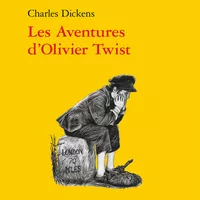CHAPITRE VII (2)
arrachait les mauvaises herbes d'un carré dans un moment où il
leva son visage pâle, Olivier reconnut en lui un de ses anciens
compagnons. Olivier se sentit joyeux de le revoir avant de
s'éloigner; quoique plus jeune que lui, cet enfant avait été son
petit ami, son compagnon de jeu; ils avaient été tant de fois
affamés, battus, enfermés ensemble!
«Chut, Dick! dit Olivier, comme l'enfant courait à la porte et
passait ses petits bras à travers les barreaux pour lui faire
accueil; est-ce qu'on est levé?
- Non, il n'y a que moi, répondit l'enfant.
- Il ne faut pas dire que tu m'as vu, Dick, reprit Olivier; je me
sauve; on me bat et on me maltraite, Dick; je vais chercher
fortune, si loin, si loin que je ne sais où. Comme tu es pâle!
- J'ai entendu le médecin dire que j'allais mourir, répondit
l'enfant avec un léger sourire; je suis bien content de te voir,
mon cher ami; mais ne t'arrête pas, ne t'arrête pas.
- Oui, oui; mais je veux te dire au revoir, reprit Olivier. Je te
reverrai, Dick, j'en suis sûr; et alors tu seras bien portant et
heureux.
- Je serai heureux, dit l'enfant, quand je serai mort, et pas
avant, le médecin a raison, Olivier; car je rêve souvent du ciel
et des anges, et de douces figures que je ne vois jamais quand je
suis éveillé. Embrasse-moi! ajouta l'enfant en grimpant sur la
petite porte et en croisant ses petits bras autour du cou
d'Olivier. Adieu, mon cher ami; que Dieu te bénisse!»
Cette bénédiction sortait de la bouche d'un enfant, mais c'était
la première qu'Olivier eût jamais entendu appeler sur sa tête. Au
milieu des épreuves, des souffrances, des vicissitudes de sa vie,
il ne l'oublia jamais.

